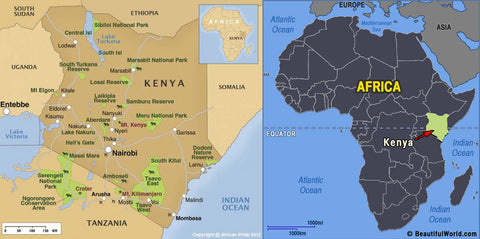
For us it’s always a very special and precious time of year when the current Kenya crop of green coffee arrives at our roastery. This year’s Kenya crop is no exception.
A Kenya coffee on the cupping table always stands out for its complex sweetness and vibrant fruit acidity. Kenya’s unique climate and geography, notable varietals and unique processing has lead to the country’s well deserved reputation of producing truly exceptional coffee.

Mount Kenya (photo from africapoint.com)
Much of the Kenya's coffee is grown in the plateaus south of Mount Kenya, the second highest mountain in Africa after Mt Kilimanjaro. The coffee is grown in this region at elevations from 1400-2000m. The climate includes a well distributed annual rainfall, cool mornings and evenings, and cloud cover which shield plants from the intense equatorial sunlight. The elevation and climate, combined with well drained, loamy volcanic soil results in ideal growing conditions for coffee plants.

Kenya’s history in coffee growing began with Bourbon varietals brought in by French missionaries in the late nineteenth century and Mocha varietals from Yemen brought introduced by Scottish missionaries. The 1930’s saw the establishment of the Kenya Coffee Board and the creation of the coffee auction system still in use today. Scott Labs was hired by the government during this time to identify and develop varieties best suited for drought resistance, productivity and cup quality. Scott Lab’s work lead to two of Kenya’s most prominent cultivars - SL - 28 and SL- 34. In the 1980’s a new varietal, Ruiru-11, was developed in an effort to combat Coffee Berry Disease and Leaf Rust. However, Ruiru-11 produced an inferior cup profile compared to SL-28 and SL-34. More recently a new varietal, Batian (named after the highest mountain peak in Kenya), has shown promise in balancing crop disease resistance while maintaining cup quality.
While coffee growing was initially exclusive to colonial estates, today about half of Kenya’s coffee production comes from small land holders (farms of 1-14 hectares). These small holders send their coffee to centralized wet mills where it is processed with coffee from other farms in the region. This ‘common’ processing is why Kenya coffee is typically sold under the name of the washing station, region or subregion and not the farm’s or farmer’s name. Direct, non-auction, sales between growers and overseas buyers comprises only 5 - 15% of Kenya’s total coffee exports.
One of the more distinguishing characteristics of Kenyan coffee is its “double fermentation” or “double soak” post harvest processing. The coffee, after being harvested and pulped, is initially washed of mucilage and soaked for 12 to 72 hours, then separated by density and then soaked again for an additional 12 hours before going to drying. The beans are then dried on raised beds anywhere from a few weeks to months after which time they are subject to a rigorous size grading process. The beans are assigned designations or grades from AA, AB, PB, B, E, C, TT, T and MH/ML with AA and AB being the more popular and prized premium coffees.
Kenya’s coffee exports have dropped significantly from its high water mark of 2.1 million bags (3.1% of the world market share) in the mid-1980s to just 650,000 bags in the more recent 2015-2016 harvest - the lowest level in 50 years. The decline is due to a number of factors including climate change but also Kenya’s expanding middle class which has driven up property values resulting in some of the larger estates being overtaken by developers. Smaller land holders have turned to growing vegetables or more lucrative export crops such as macadamia nuts. (So no matter how expensive you think that bag of Kenya coffee costs, it is still in many cases not priced sufficiently to keep many farmers and growers in coffee production.) The upcoming growing season is projected to slightly exceed last year’s harvest. Kenya’s government remains an active player in the coffee industry, promoting local coffee roasting to increase coffee earnings and also sate the demand for coffee from the growing Kenyan middle class.

Artcafe, a coffee house in Nairobi (photo from: goplacesbookings.com)
This year we are fortunate to be able to offer an AA Kenya coffee from Nyeri. This is one of the sweetest Kenyan coffees we’ve had the pleasure of roasting and offering in this shop. The sweetness is complemented by a sparkling grapefruit acidity and creamy body.
This coffee will be the very first to ship in our new 3 month coffee subscription program projected to go live next week. We will be posting more about subscriptions as soon as we work out a few more details!

